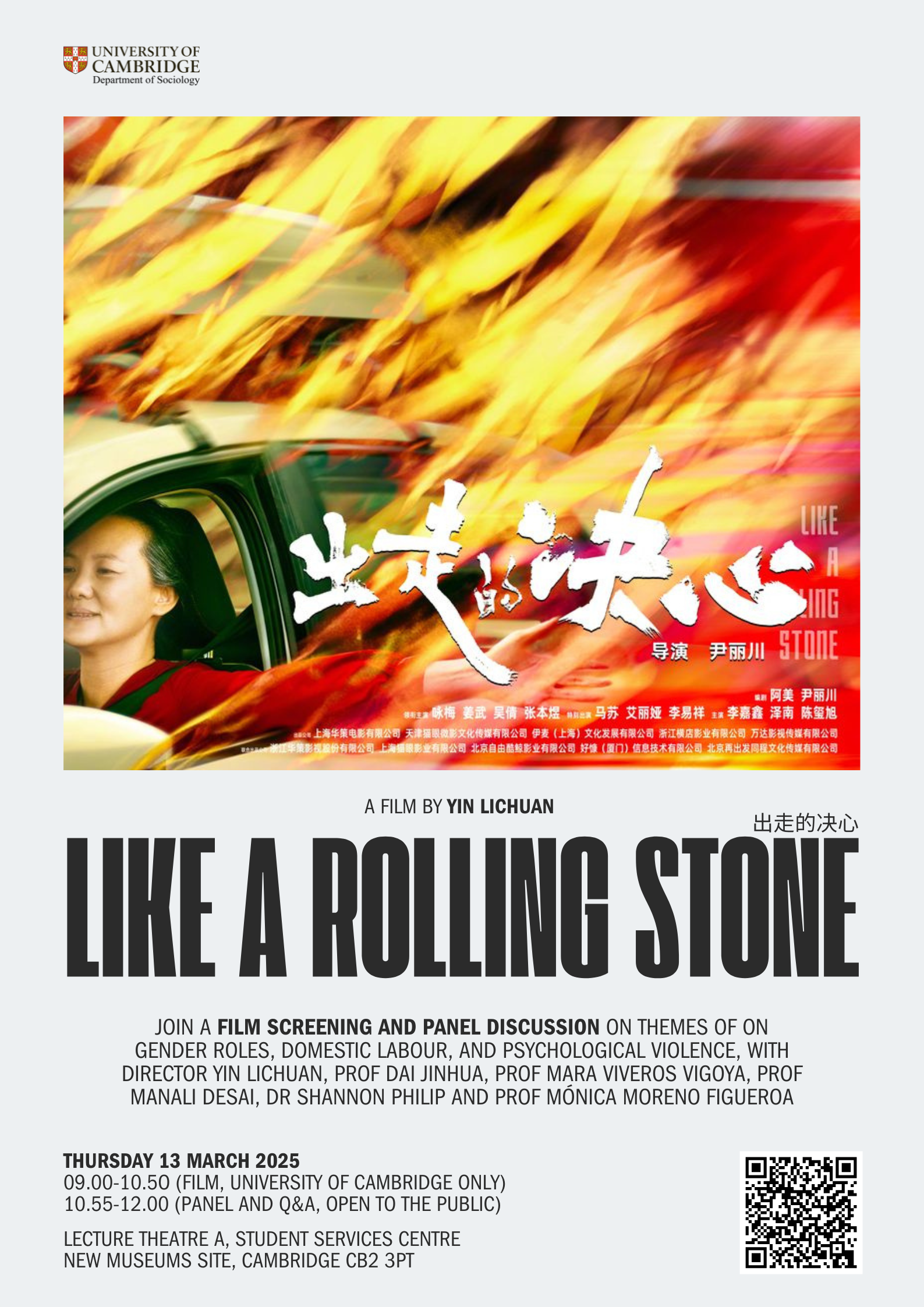
Join us for a Cambridge-exclusive film screening of Like A Rolling Stone (2024) , followed by a panel discussion with who will offer further insights into themes present in the film, including gender roles, domestic labour, and psychological violence.
Tickets: Registration required via Tickettailor.
Abstract
This event features Like A Rolling Stone (2024), a Chinese film based on the true story of Su Min, a woman who set out on a self-driven journey of liberation at the age of 50. Based on these real events, this film portrays Li Hong (played by Yong Mei), a romantic woman caught between traditional gender roles, imposed familial duties and personal freedom. As Li is repeatedly forced to postpone her aspirations due to the escalating burdens of household responsibilities, she decides to stop waiting when she turns 50 and embark on a solo road trip to reclaim her life’s passions. Interweaving fiction with reality, this movie portrays women’s struggles between social expectations and self-awakening.
Following the film screening (09.00-10.45, University of Cambridge only), there will be a panel discussion and Q&A (10.50-11.45, open to the public) to offer further insights on gender roles, domestic labour, and psychological violence. The panel will consist of the director, Yin Lichuan, alongside Prof. Dai Jinhua, Prof. Mara Viveros Vigoya, Prof. Manali Desai, Dr. Shannon Philip and Prof. Mónica Moreno Figueroa,
About the panellists
Yin Lichuan is a poet, screenwriter, and director. Graduated from Peking University’s Department of Western Languages and ESEC Film School. Her publishedworks include Comfort Me Again, 37.8°C, and The Good Intentions of a Rascal. She wrote and directed films such as The Park (2007), Knitting (2008), and Like a Rolling Stone (2024) and was the screenwriter for Under the Hawthorn Tree (2010). Her accolades include Best Directorial Debut at the Beijing College Student Film Festival and Best Film at the Créteil International Women’s Film Festival(France). Her works have been featured in the Cannes Film Festival’s Directors’ Fortnight section.
Professor Dai Jinhuais a Professor in the Department of Chinese Language and Literature and Director of the Center for Film and Cultural Studies at Peking University. In 1987, she helped establish China’s first academic program in Film History and Theory. Since 1994, she has lectured on Chinese cinema and popular culture at over ten U.S. universities, including Cornell, Harvard, and UC Berkeley. In October 1995, she founded China’s first Comparative Cultural Studies Laboratory. She was appointed a part-time professor at Ohio State University’s Department of East Asian Studies in 1997 and became a full professor at Peking University the same year. One of China’s most influential feminist scholars in film and cultural studies, her research focuses on Chinese film history, popular culture, and feminist literary criticism.
Professor Mara Viveros Vigoya is a professor at the Department of Anthropology and the School of Gender Studies at the Universidad Nacional de Colombia in Bogota, Colombia, and a former President of the Latin American Studies Association. She is currently the Simon Bolivar Professor 2024-2025 at the University of Cambridge. Her research interests include issues related to the relationship between social differences and inequalities, and intersections of gender, sexuality, class, race and ethnicity in the social dynamics of Latin American societies.
Professor Manali Desaiis a Professor of Comparative and Historical Sociology, and a Fellow of Newnham College. Her work encompasses the areas of parties and political articulation, social movements, ethnic and gendered violence, and post-colonial studies. Her current research, which is funded by the ESRC/GCRF Large Grant (£1.76 million) is a comparative qualitative project titled Gendered Violence and Urban Transformation in India and South Africa.
Dr Shannon Phillip is an Assistant Professor in the Sociology of Gender and Sexuality, who’s research focuses on the relationship between masculinities, femininities and sexualities in cities of the Global South. He has carried out long-term ethnographic and qualitative fieldwork in New Delhi and Johannesburg exploring questions of men’s violence towards women and queer people, embodied performances of class, gender and sexuality, as well as the transforming articulations of heteropatriarchal and heteronormative power
Professor Mónica Moreno Figueroais a Professor of Sociology at the University of Cambridge and a Fellow in Social Sciences at Downing College, Cambridge. Her research focusses on the intersectional lived experience of ‘race’ and racism in Mexico and Latin America; antiracism and academic-based impact; feminist theory, intersectionality and racism. She is an expert in qualitative research methods, visual methodologies and thrives in interdisciplinary collaborations.
About the organisers
Ni Yutong is a Film studies MPhil graduate at Hughes Hall. Her research interests are revolutionary female image in 20th-century Chinese cinema andfemale discourse in contemporary. She works as a documentary producer and serves as a PR consultant supporting non-profit organisations dedicated to women’s rights. Her focus includes exploring cinematic themes in literary works and actively promoting the dissemination of Chinese cinema, as well as promoting academic exchanges between Chinese and British scholars.
Qin Tianran is a Sociology PhD student at Queen’s College. Coming from a film production and film theory background, her research focuses on the Chinese‘Big Heroine Drama’ defined as having a core female character with the plot revolving around her growth and success. Through her analysis of the Big Heroine phenomenon, she reflects on current gender conflicts, class differences, and racial/ethnic alienation/assimilation in mainland China. Herresearch takes an intersectional approach in analyzing the structural tensions between gender, class, and race/ethnicity, taking the Big Heroinephenomenon in Chinese television as a superficially presenting symptom of deeper sociocultural tensions.
Accessibility statement
The seminar room is accessed via two flights of steps/a lift and then a further two flights of stairs accessed through a heavy set of doors. There is no step-free access. The lift is not accessible to wheelchair users, but may assist with other mobility issues. Please contact enquiries@sociology.cam.ac.uk with any questions.




